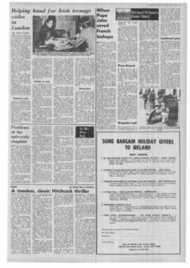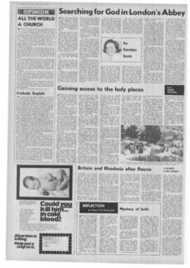Page 3, 2nd June 1972
Page 3

Report an error
Noticed an error on this page?If you've noticed an error in this article please click here to report it.
Tags
Share
Related articles
Sir Alfred Hitchcock Dies
Hitchcock Absolves The Jesuits
A Middle-class Aviary
'hitch' Simply : Plainly And A Craftsman
Films
A timeless, classic Hitchcock thriller
by Freda Bruce Lockhart
THE Old Master of Horror is home again, at least on the screen, and in his very top form. Alfred Hitchcock could be said to have been the first director to put London fairly and squarely on the cinema map with his early British movies. Now twenty years after his last London-set movie, Frenzy ("X" Paramount) opens with a giant map shot of the gates of London.
There on the embankment a government minister is holding
la forth about plans . for banishing pollution, when his hearers' attention is diverted and Hitchcock's first corpse fished out of the muddy shallows: a naked woman strangled with what looks like an old school tie.
The hunt is on for the necktie strangler. First suspicions lead to Richard Blaney (Jon Finch) a former R.A.F. hero, now working as a barman in a Covent Garden pub. Evidence easily accumulates which might convince the police, •but we soon learn from one of the horridest murders ever filmed that not Blaney but his friend Rusk (Barry Foster), who works in the Market, is the menace.
From this point suspense becomes a question not of whodunit but of who will take the rap, a contest kept going with masterly ingenuity, pace and variety.
Hitchcock has also done the police proud, notably by casting that superb actor Alec McCowen as Inspector Oxford, and making Oxford not a caricature or stereotype cop but an intelligent. hardworking, believable man.
McCowen is only the chief of the distinguished •players (they also include Billie Whitelaw, Anna Massey, Barbra LeighHunt, Bernard Cribbing and Ralph Thomas) who subordinate their talents in what are sometimes only "bit" parts to nerfecting the detail of a Hitchcock masterpiece.
Some people find "Frenzy" old-fashioned. I could only think it so in the sense that it is classical, a timeless Hitchcock thriller in the direct line from "Blackmail" or "The Man Who Knew Too Much," but able to reach out and take in topical preoccupations like pollution and incidental perversities of the permissive age.
Cabaret ("X" Prince Charles Theatre) is based on the New York stage production of the musical play of the
same name based on the play by John van Druten and stories by Christopher Isherwood. No doubt all these sources are part of the folk memory of my generation.
But my own vivid wartime and pre-war memories have curious blanks where I suppose personal preoccupations protected me from becoming involved in such public issues as the Spanish Civil War or Mr. Isherwood's last days in Berlin.
So I'm afraid I can't compare the film "Cabaret" with any of its primary or secondary sources. I find it a brilliant musical extravaganza, almost a black musical, on the analogy of black comedy, decidedly echoing the febrile, hectic, neurotic. decadent atmosphere associated with the Berlin of those desperate times, the city whose art form indeed seemed always peculiarly to be cabaret.
Judy Garland's daughter seems at first an odd choice for Sally Bowles, the little English adventuress living by her wits in Berlin. But Liza Minnelli is just about as great an entertainer as her mother and carries the show with verve and gusto. Michael York is just right as her neighbour in the Schneider boarding house, until both are sucked into the surrounding shifting swamp where frenzied gaiety is threatened by the Nazi horrors just beneath the surface.
Five new movies are so diverse that there should be something in them for everybody. if you are anti
Establishment, anti-English
anti-public school, anti-Christian, and have no fear of blasphemy or vulgarity, The Ruling Class ("X" Odeon Haymarket) will be for you. It is not for me.
More's the pity, as the cast contains some of my favourite British actors: Peter O'Toole (as an idiot Earl who imagines he is Christ), Alastair Sim (as the Bishop in the family) Harry Andrews (as the kinky 12th Earl), Arthur Lowe (as the butler) and Coral Brown (as Lady Claire).
The title of Bleak Moments ("A" Paris-Pullman) might sound like a warning, though the plot suggests a scene of unrelieved gloom for the characters concerned. They live totally isolated either by circumstance or by inarticulacy. Sylvia (Anne Raitt) is tied to the mentally retarded sister. Hilda (Sarah Stephenson) she looks after; while Pat (Joolia Cappleman), a kind plain girl she works with, is tied to her bed-ridden mother. Of the two young men she occasionally sees, Norman (Mike Bradewell) is a guitar-playing drop-out, Peter (Eric Allan) a
completely ineffectual schoolteacher. I should hesitate to recommend it to anybody as jolly entertainment. But anybody prepared to stay it out might find the risk rewarded.
blog comments powered by Disqus









